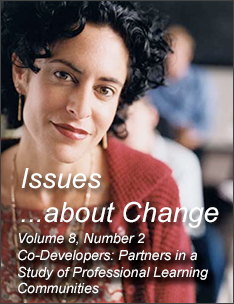Contributors to Applied Research
Co-Developers provided valuable data for SEDL's research through completing and administering a variety of instruments, and through sharing their stories in oral and written forms. At SEDL conferences, a number of methods—including narratives and visual displays, audiotape recordings of Co-Developer reports and focus group proceedings, and observations by SEDL staff—were utilized to capture data from Co-Developers, principals, and teachers. SEDL provided Co-Developers with archival data collection forms and other materials to guide them in recording important events in the development of their schools as PLCs.
As an aid to recording their continuing process, SEDL also developed and provided Co-Developers with a casebook organized to capture what they did at their schools and what happened as a result of their school improvement activities. The casebook was further designed to help Co-Developers report how their interventions and activities promoted one or more of the five dimensions of a PLC. Co-Developers were encouraged to include descriptions of critical incidents—planned or unplanned, successful or unsuccessful—which they recognized as particularly significant in their efforts to create a PLC.
In January 1999, after most of the Co-Developers had been in their schools for approximately five months, SEDL hosted a writing conference designed to capture the stories of their initial work in the schools in written form. Prior to the conference, SEDL requested that Co-Developers prepare a draft of their stories focused on the initial actions taken by the Co-Developers, principals, and school staff that contributed to one or more of the five dimensions of a PLC.
At the conference, SEDL organized Co-Developers into teams of five or six, and provided guidance in how to structure and relate their stories to their colleagues. SEDL coached Co-Developers in the use of a dialogue protocol to solicit warm and cool feedback, provide encouragement, clarify events, and offer suggestions to colleagues on their stories. This interaction helped Co-Developers improve and revise their written drafts to include more clarity and detail and deepened the sense of shared overall effort to developing their schools as professional learning communities.
In addition, SEDL trained Co-Developers in the administration of other instruments, including the PLC assessment, School as a Professional Learning Community Survey (Hord, 1999). SEDL requested that all Co-Developers first administer the PLC assessment instrument to provide baseline data about how the school staff perceived itself along a continuum of each of the five dimensions of a PLC. This information profiled the campus at the initial stage of the project and further helped the Co-Developers learn about the school. Subsequent administrations of the PLC survey measured each school's progress, and Co-Developers shared these results with their school staffs. SEDL also designed training to prepare Co-Developers to use an interview protocol to collect perceptual data from school personnel on their progress in becoming professional learning communities.
Next Page: Disseminators of Information about the Project to Other Audiences

